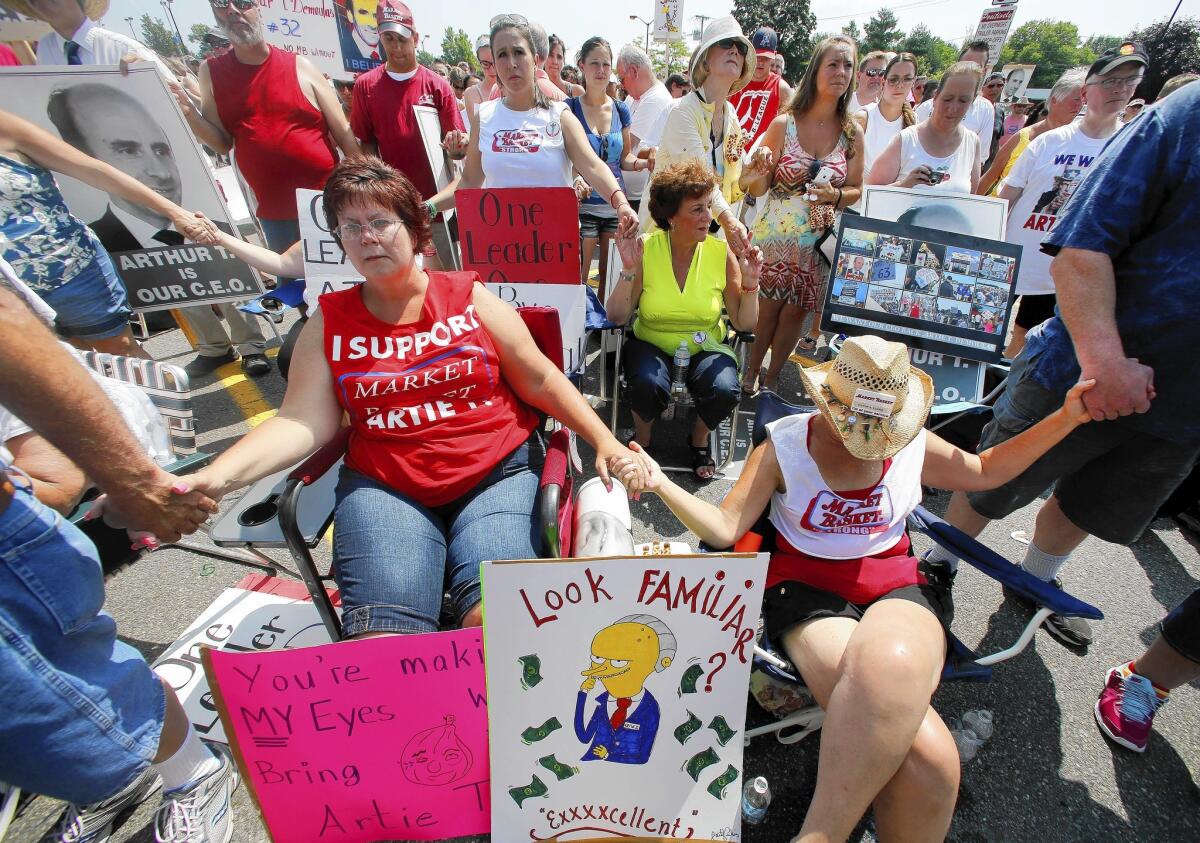Market Basket workers, customers rally around beloved CEO after firing

Thousands of customers are boycotting stores, drivers are refusing to deliver supplies, and hundreds of employees are picketing outside offices and skipping work.
It’s not because the company in question, Market Basket, treats employees badly or jacked up prices.
The grocery chain recently fired its beloved chief executive, whom employees, customers and suppliers have hailed as a rare creature in today’s business world: a man who put employees’ welfare ahead of the bottom line.
“Artie is a people person, who places people before profits; he cares about you as an individual,” said Joe Garon, who worked at Market Basket for 49 years until he was dismissed last month after publicly protesting the firing of his CEO. “There’s good pay, good working conditions, good benefits. That’s why people don’t leave.”
The Market Basket chain, which has 25,000 employees and 71 stores in Massachusetts, New Hampshire and Maine, was founded by Greek immigrant Arthur Demoulas nearly a century ago.
His two grandsons, Arthur S. Demoulas and Arthur T. Demoulas, have warred over control of the company for decades. In June, Arthur S. gained control of the company board and fired Arthur T., who had been chief executive for eight years and had been managing the company for years before that.
It’s Arthur T. who employees say instituted a profit-sharing plan that allows retirees to walk away with an impressive retirement plan, who gave holiday bonuses, who encouraged grocery baggers to work their way up the corporate ladder to a corner office. It’s Arthur T. who kept prices fair for customers, and who treated suppliers fairly, and who always had a kind word for every customer, employer and supplier he encountered.
Eight middle managers in the corporate office in June asked for the chief executive to be reinstated; they were fired a few weeks later after leading protests about the firing. One rally at company headquarters drew 10,000 employees, customers and other supporters.
On a recent rainy weekday, the aisles of a Market Basket store in densely populated Somerville were devoid of customers. Though some aisles were well-stocked, others that usually hold bread, meat and vegetables sat empty. A sign in Spanish on one of the empty vegetable stands encouraged customers to contact Market Basket board members to demand the return of the chief executive.
“Our only CEO is Arthur T. Demoulas, Our true leader,” read a sign in English on the front window of the spacious supermarket. Next to it was a poster of Arthur T. Demoulas’ face, in red and blue tones in the style of Shepard Fairey’s “Hope” poster of Barack Obama. “I believe,” the poster read. The signs were even posted in the store, on the windows of the customer service department.
The protests are extraordinary, observers say. Companies are bought and sold every week, and CEOs are fired. But usually employees just watch the changes and hope they’re not next.
“What’s so unusual is that a community of workers who aren’t in a union have come together to try and exert some influence on the board and exert influence on the customer base,” said Carl Van Horn, director of the Heldrich Center for Workforce Development at Rutgers University.
After all, unions would love to have this kind of influence on workers and customers, but they’ve been losing power for decades.
Market Basket employees seem to be aware that they had it good, and are fighting against their CEO’s dismissal and against changes in the company. Already, the new management has talked about adjusting the profit-sharing plan, said Joe Schmidt, who worked for the company for 42 years and was one of the eight middle managers fired in July.
“We don’t want to become corporate America,” said Schmidt, who, like many others, started with the company bagging groceries. He rose to become operations supervisor in the corporate office.
The type of company Arthur T. Demoulas ran — at which employees and customers are treated with reverence — largely disappeared in the 1980s as shareholders and investors gained influence. Even benefits that were once standard have disappeared rapidly since the recession.
Only 84% of companies now offer preferred provider organization health plans, rather than the more limited health maintenance organization plans, compared with 90% that offered PPOs a decade ago, according to an annual survey of companies by the Society for Human Resource Management. Only 54% offer undergraduate education assistance, down from 71% in 2004.
“There seems to be a feeling these days that everything is directed toward shareholder benefits, but what this case is saying is that it might not be the only way,” said Daniel Korschun, a professor at Drexel University who has been studying the Market Basket story. “The idea that employees and customers want to and need to have a say in the way a company is run — if this succeeds — this could gain traction.”
What’s also surprising to observers is that Market Basket’s business model of treating employees well actually succeeded. The company generates $4.2 billion to $4.6 billion in revenue, which amounts to about $60 million per store, Korschun said. Hannaford, a competing grocery chain, has revenue of about $3 billion but twice as many stores, so it makes only about $16 million per store.
But Market Basket’s competitive advantage is in jeopardy as the weeks of customer boycotts and employee walkouts drag on. The company has cut hours for part-time employees because demand for their services dropped. Some observers worry the dispute could cripple the chain in a tough market.
On Monday, the company sent letters to employees who had not reported for work “for several weeks,” telling them to show up by Friday. If they don’t, the letter said, “the company will consider you to have abandoned your job, thereby ending your employment with the company.”
Massachusetts Gov. Deval Patrick on Wednesday called on Market Basket employees to return to work, saying that he had spoken to the two sides and that they were close to a deal. Arthur T. is said to have offered to buy out his relatives’ shares of the company, according to news reports. A woman answering the phone at the corporate office said the company was not talking to the news media.
The whole saga has turned the stomachs of some customers, including Bill Moran, 68, who was pushing a cart through the aisle of the Somerville Market Basket recently. Moran supports the protesters but was getting a few groceries at Market Basket because prices were too high at neighboring stores. He said he’d never seen Market Basket so empty.
“I really hate this,” said Moran, who recently retired and feels for the longtime employees who lost their jobs. “It’s a bad enough economy already. And then this family can’t stop fighting, even though they make so much money?”
More to Read
Start your day right
Sign up for Essential California for news, features and recommendations from the L.A. Times and beyond in your inbox six days a week.
You may occasionally receive promotional content from the Los Angeles Times.







